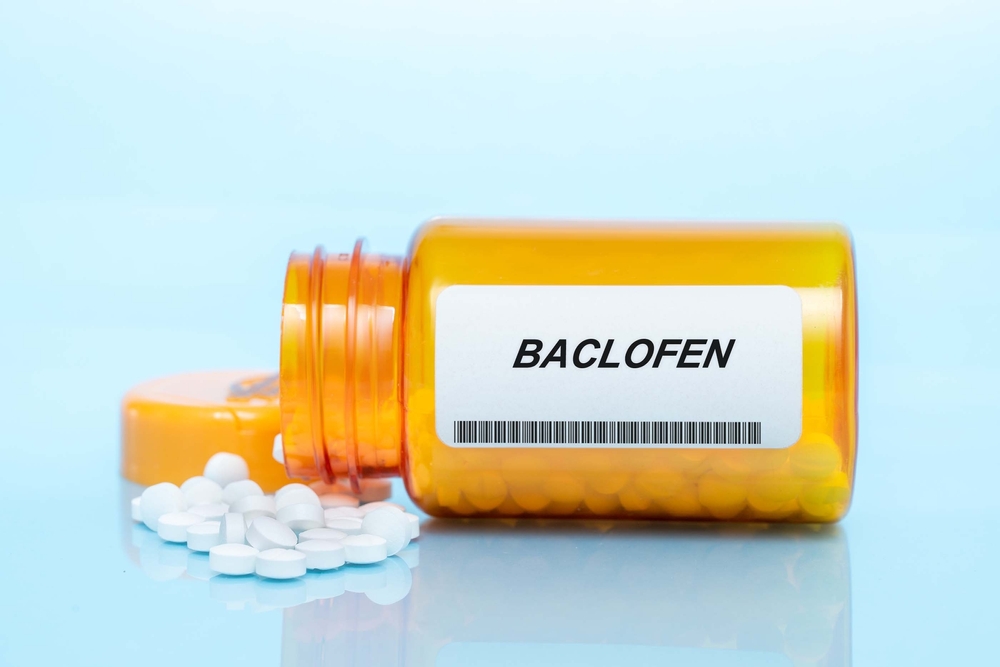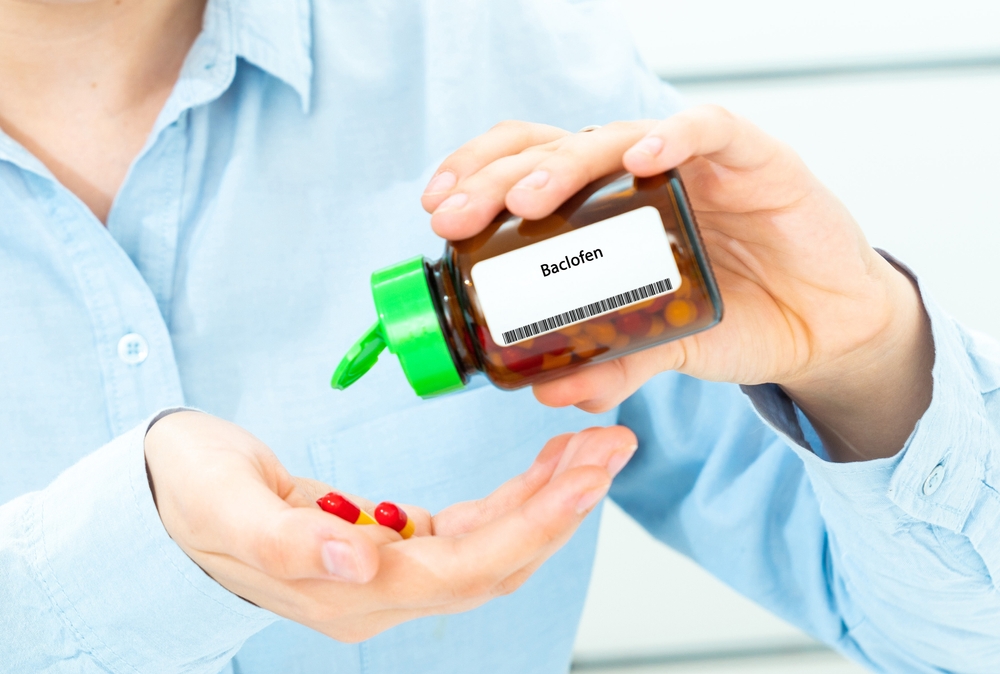Last Updated:
May 16th, 2025
Taking Baclofen as Part of the Detox Process
What Is Baclofen?
Baclofen, also known as Lioresal, is a prescription medication that was originally developed to treat muscle spasticity caused by conditions such as multiple sclerosis and spinal cord injuries. However, over time, research has shown that it may also help people struggling with alcohol addiction. While Baclofen is not officially approved for alcohol addiction treatment in some countries, many doctors prescribe it off-label for this purpose due to its potential to reduce cravings and withdrawal symptoms.
Alcohol addiction can be incredibly difficult to manage, particularly when cravings feel overwhelming. Lioresal is believed to help by dulling the desire to drink, making it easier for individuals to focus on recovery. While it is not a standalone cure, it can be a valuable tool when used as part of a structured alcohol addiction rehab programme.

How is Baclofen taken?
When Baclofen is prescribed for alcohol addiction, it is usually taken orally in gradually increasing doses.
The dosage can vary from person to person, depending on factors such as medical history, the severity of alcohol addiction and how the body responds to the medication. In most cases, doctors start with a low dose and gradually increase it over time. This helps the body adjust to the medication while minimising potential side effects.
Because Baclofen has a short half-life, it is usually taken multiple times a day to maintain stable levels in the body. Missing a dose or stopping suddenly can cause withdrawal symptoms, so it’s important to follow a doctor’s guidance when taking this medication.
How does Baclofen work?
Baclofen works by acting on the central nervous system, specifically targeting a neurotransmitter called gamma-aminobutyric acid (GABA). GABA plays a crucial role in calming the nervous system, and alcohol has a strong impact on its function.
When a person regularly drinks large amounts of alcohol, their brain becomes dependent on it to regulate GABA activity. This is one of the reasons why stopping alcohol suddenly can lead to withdrawal symptoms such as anxiety, tremors and even seizures.
Lioresal mimics some of the effects of alcohol on the GABA system, helping to reduce withdrawal symptoms and cravings. Unlike alcohol, however, Lioresal does not produce the same euphoric or intoxicating effects. Instead, it stabilises the nervous system, making it easier for people to manage their cravings and focus on recovery.
Does Baclofen stop alcohol cravings completely?
One of the biggest questions surrounding Baclofen is whether it completely eliminates alcohol cravings. The truth is, while Baclofen can significantly reduce cravings, it is not a miracle cure for alcohol addiction. No single medication can instantly remove the complex psychological and physical factors that contribute to addiction.
Baclofen is most effective when used alongside a comprehensive alcohol addiction rehab programme that includes therapy and lifestyle changes. The medication can make it easier to resist the urge to drink, but it does not address the emotional and behavioural aspects of addiction. For this reason, relying on Baclofen alone without professional treatment may not lead to long-term recovery.
That being said, many people who take Lioresal report a noticeable reduction in cravings, which can be a huge relief, especially in the early stages of sobriety. By making it easier to manage urges, the medication gives individuals a better chance of staying on track with their recovery.
Can anyone with alcohol addiction take Baclofen?
Baclofen is not suitable for everyone, and it is always important to consult a doctor before starting this medication. Certain health conditions and medications can make Baclofen riskier to take.
For example, Lioresal may not be recommended for individuals with:
- A history of severe kidney disease, as the medication is primarily processed through the kidneys.
- A history of psychiatric disorders, such as severe depression or psychosis, as Baclofen has been linked to changes in mood and mental state.
For those who are good candidates for Baclofen, the medication is generally well tolerated. However, side effects such as drowsiness, dizziness, nausea and fatigue can occur, particularly when first starting or adjusting the dose.
Is Baclofen addictive?
Baclofen is not considered to be physically addictive in the way that alcohol, opioids or benzodiazepines are. It does not produce the same type of euphoric high that drives people to misuse substances. However, there is a psychological aspect to consider.
For some people, Baclofen becomes a safety net that helps them manage cravings and maintain sobriety. While this is beneficial during treatment, it can lead to psychological dependence, where they feel they cannot stay sober without it. This is similar to how some people develop a reliance on anti-anxiety medication—not because they are physically addicted but because they fear how they will cope without it.
This is why it is essential for anyone taking Lioresal to have a plan for eventually tapering off the medication under medical supervision. A strong support system, therapy, and coping strategies should be put in place to help with the transition.

Does Baclofen cause withdrawal symptoms if stopped abruptly?
Baclofen withdrawal can occur if the medication is stopped suddenly. This happens because the body has adjusted to its effects, and a sudden absence can cause a rebound effect in the nervous system.
Withdrawal symptoms from Baclofen can include:
To prevent withdrawal symptoms, Lioresal should always be tapered down gradually under the guidance of a doctor. Slowly reducing the dosage allows the nervous system to adjust, minimising the risk of severe reactions.
For anyone who has been taking Baclofen for alcohol addiction, a structured plan for discontinuing the medication should be part of their overall recovery strategy.
Take the first step with Addiction Helper
If you or a loved one is struggling with alcohol addiction, getting the right support is crucial. At Addiction Helper, we can connect you with the best treatment options, including detox programmes that use medications like Lioresal to ease withdrawal and reduce cravings.
Our team is constantly available to offer confidential advice and guidance. Whether you’re looking for detox, rehab or long-term support, we’re here to help you every step of the way.
Call us now or request a free callback to start your journey towards sobriety today.
Our compassionate team are ready and available to take your call, and guide you towards lasting the lasting addiction recovery you deserve.
Frequently Asked Questions
(Click here to see works cited)
- de Beaurepaire R, et al. The Use of Baclofen as a Treatment for Alcohol Use Disorder: A Clinical Practice Perspective. Front Psychiatry. 2019 Jan 4;9:708. doi: 10.3389/fpsyt.2018.00708. PMID: 30662411; PMCID: PMC6328471.
- “Baclofen.” NHS Choices, NHS, www.nhs.uk/medicines/baclofen/how-and-when-to-take-baclofen/. Accessed 18 Feb. 2025.
- de Beaurepaire, Renaud. “A Review of the Potential Mechanisms of Action of Baclofen in Alcohol Use Disorder.” Frontiers, Frontiers, 25 Sept. 2018, www.frontiersin.org/journals/psychiatry/articles/10.3389/fpsyt.2018.00506/full.
- Minseon Cheong, et al. “Prevalence and Risk Factors of Baclofen Neurotoxicity in Patients with Severely Impaired Renal Function.” Nefrología, Elsevier, 24 July 2020, www.sciencedirect.com/science/article/pii/S0211699520300515.
- Mithra B. Maneyapanda MD a, et al. “Psychosis Following an Increase in Intrathecal Baclofen.” PM&R, No longer published by Elsevier, 23 June 2016, www.sciencedirect.com/science/article/abs/pii/S193414821630226X.
- Alvis BD, Sobey CM. Oral Baclofen Withdrawal Resulting in Progressive Weakness and Sedation Requiring Intensive Care Admission. Neurohospitalist. 2017 Jan;7(1):39-40. doi: 10.1177/1941874416637404. Epub 2016 Mar 14. PMID: 28042369; PMCID: PMC5167087.

